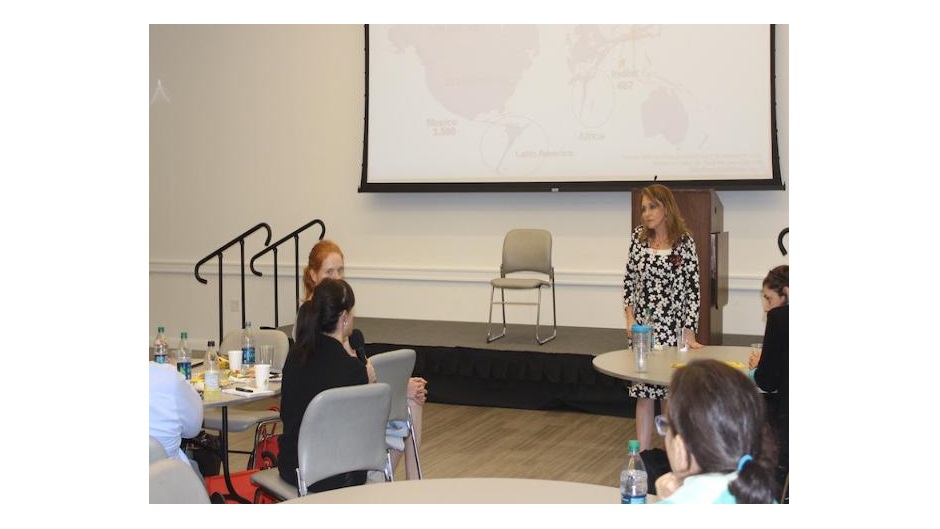While reflecting on her own experience with breast cancer, Dr. Felicia Knaul delivered a talk on global health and breast cancer in low and middle-income countries at the University of Miami (UM) College of Arts & Sciences’ Women’s and Gender Studies colloquium luncheon, held last week in the Donna E. Shalala Student Center.
Dr. Knaul presented her study taken from the co-authored Lancet Commission Report titled, Women and Health: The Key for Sustainable Development. In her speech, Dr. Knaul addressed how women in poorer countries without proper health care face a “double burden” dealing with communicable and non-communicable diseases. In one slide, Dr. Knaul presented current reasons why women die around the world. The chart noted a 35 percent decrease in maternal mortality rates in the last 30 years, yet it also illustrated serious health risks women in Latin America and the Caribbean face today, such as high mortality rates from breast cancer, cervical cancer and diabetes.
“Very few women should die at childbirth if they have access to even the most basic of health care technologies,” said Dr. Knaul. “The message here is that it doesn’t make any sense, either ethically or as an economist, to invest in saving a woman the day that she gives birth but then allowing her to die a few years later of a preventable cervical cancer, a treatable breast cancer or a manageable case of a disease like diabetes – it just isn’t right, but it’s also not the sensibly right thing to do.”
Dr. Knaul also presented findings illustrating the inequality of survival rates in breast cancer and cervical cancer within Mexico’s rich and poor states. For example, in Mexico’s poorer states like Oaxaca and Puebla in the south, the mortality rates for women with cervical cancer and breast cancer were much higher than in Mexico’s richer states, such as Distrito Federal and Nuevo Leon, located in the country’s northern region.
In response to Mexico’s insufficient health care system, UM President Julio Frenk worked on a new comprehensive national health insurance program for millions of Mexico’s poorest families, known as Seguro Popular. Nevertheless, according to Dr. Knaul, the system was far from flawless since many physicians were unprepared to even detect early forms of breast cancer. “We responded by training thousands of primary healthcare personnel, including community health workers, to be able to detect early signs of breast cancer. They had no information of breast cancer [detection] at this point simply because the system assumed poor women didn’t get breast cancer,” said Dr. Knaul.
Dr. Knaul also noted that many patients did not have access to common painkillers like morphine. To help combat this issue and to make sure “patients should not die in pain,” she created a global commission to address the inequitable distribution of morphine. The commission should release its findings next year; President Frenk is also a member of the commission. “It is a huge amount of work, one in which I will welcome any and all support that any of you feel you can give,” said Dr. Knaul to the audience of UM faculty and staff.
During an emotional moment, Dr. Knaul tearfully explained how her experience fighting breast cancer has changed her into an optimist “optimalist” – changing a perception from what is negative to something positive and good. Dr. Knaul and Dean of the College of Arts & Sciences Leonidas Bachas will present a panel discussion with Dr. Ana Langer, professor at Harvard T.H. Chan School of Public Health, about the Lancet Women and Health Commission Report on Oct. 2, 2015 at the Shalala Student Center from 9 a.m. to 11 a.m. For more information and to RSVP, visit http://www.as.miami.edu/mia/events/.
Photo caption: Dr. Felica Knaul answers questions after her emotional and informative speech at the Women’s and Gender Studies colloquium luncheon where she discussed her research on global health and breast cancer.
September 29, 2015

